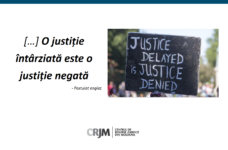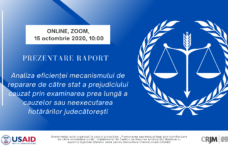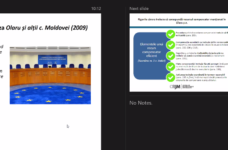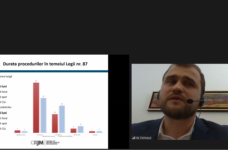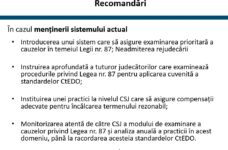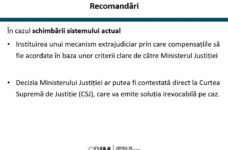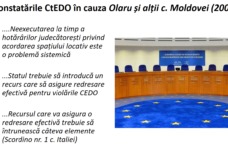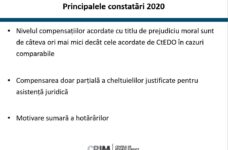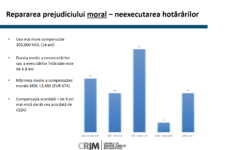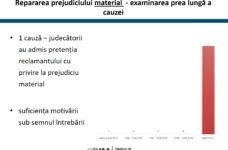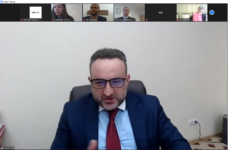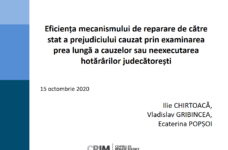Justice delayed is justice denied. Therefore, lately, special attention has been paid to the length of proceedings at European level. Moldova did not have and does not have chronic problems length of court proceedings. On the contrary, Moldovan courts examine all types of cases about 2.8 times faster than the Council of Europe’s average.[1] However, until the middle of the last decade, the non-enforcement of judgments was a particularly severe problem. Things have not changed significantly in terms of non-enforcement of judgments requiring allocation of social housing.
In Olaru and Others v. Moldova judgement (28 July 2009), the European Court of Human Rights (ECtHR) called on the Government, inter alia, to establish a remedy at the national level for victims of the non-enforcement of judgments on housing. For this purpose, on 21 April 2011, the Parliament passed the Law no. 87 on the compensation by the state of the damage caused by the violation of the reasonable time requirement or of the right to the enforcement of the judgement within a reasonable time (Law no. 87). Under this law, persons who believe that their cases are examined with excessive delays, or judgments in their favor have not been enforced for too long, may apply to the court for compensation of material and moral damages. Judges are obliged to examine such claims within a short time.
In 2014, the LRCM analyzed over 90% of all proceedings filed under the Law no. 87 and as part of which an irrevocable judgment was adopted between September 2012 and October 2013. The LRCM’s analysis found that, inter alia, such actions were examined rather slowly, while judges provided superficial reasoning to their judgments in such cases and even stated that the reasonable time requirement was violated, although the ECtHR standards do not allow for such conclusions.[2] Compensations awarded for moral damage were lower than that those awarded by ECtHR in comparable cases, while only a small part of justified legal costs were compensated.[3] This document was developed in order to further promote the uniformity of judicial practice and to increase the practical efficiency of the mechanism introduced by the Law no. 87.
After more than six years, the LRCM analyzed again the practice of examination of such types of cases. In total, 176 cases with irrevocable judgments were analyzed between October 2017 and March 2020. The purpose of the analysis is to assess the effectiveness of the mechanism introduced by the Law no. 87, and to establish, whether if there have been changes in the length of their examination actions, the quality of the reasoning of the decisions, as well as the awarded compensations. The efficiency of the acceleratory remedy introduced by Law No. 88 or other remedies for breach of the reasonable time requirement, are not covered by this document.
The analysis of the practice from October 2017 to March 2020 confirms that the practice of application of the Law no. 87 has not changed significantly compared to 2012-2013. A case regarding the violation of the reasonable time requirement was examined on average for 11.6 months, while a case regarding the non-enforcement of judgments – for 12.8 months, which is a lot. The level of compensations granted rarely meets the recommendation of the Supreme Court of Justice (SCJ) and the ECtHR practice, while justified legal costs are only partially compensated.[4] The reasoning of judgments on the merits, as a rule, is even shorter than in 2012-2013 and sometimes it is impossible to identify concrete arguments on which the judgment is based. Usually, the reasoning provided by judges is limited to one sentence, while reiterating the parties’ arguments and claims. Moreover, the reasoning of judgments in at least 9% of all cases analyzed raises questions as to the validity of the judicial solution.
[1] LRCM, “Justice of the Republic of Moldova in figures – a comparative perspective” (2019), p. 18, available online: https://old2.old.crjm.org/wp-content/uploads/2019/10/Justi%C8%9Bia-din-Republica-Moldova-%C3%AEn-cifre-%E2%80%93-o-privire-comparativ% 4% 83_final-web.pdf .
[2] LRCM, “The mechanism for compensation of damages caused by the violation of reasonable time requirement — is it efficient?”; (2014), pp. 6 – 10, available online: https://old2.old.crjm.org/wp-content/uploads/2019/10/Justi%C8%9Bia-din-Republica-Moldova-%C3%AEn-cifre-%E2%80%93-o-privire-comparativ% 4% 83_final-web.pdf .
[3] Idem, p. 10.
[4] LRCM, “The mechanism for compensation of damages caused by the violation of reasonable time requirement — is it efficient?” (2014), pp. 6 – 10, available online: https://old2.old.crjm.org/wp-content/uploads/2019/10/Justi%C8%9Bia-din-Republica-Moldova-%C3%AEn-cifre-%E2%80%93-o-privire-comparativ% 4% 83_final-web.pdf , p. 10.

